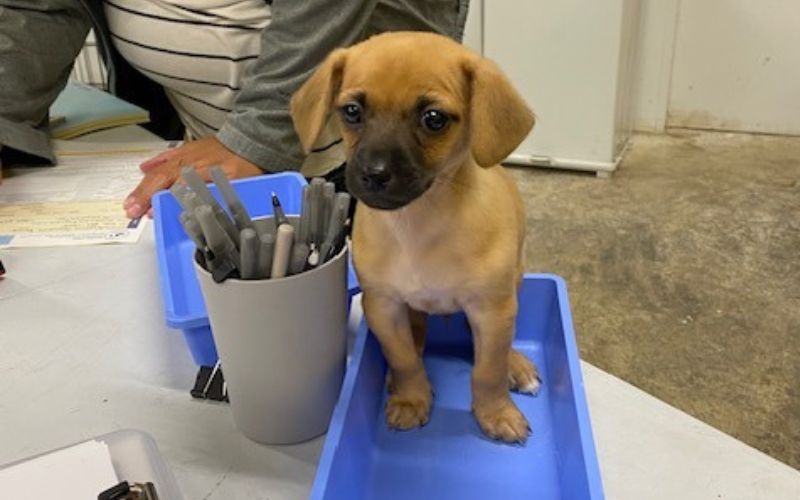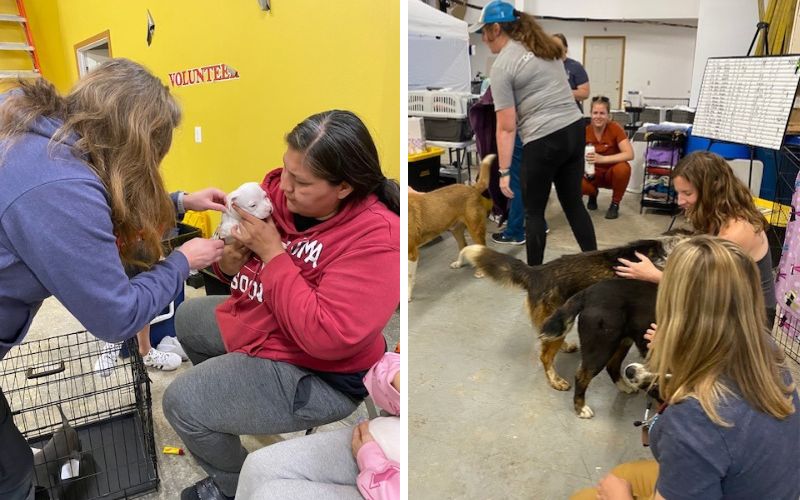
- Details
- By Elyse Wild
On the Rocky Boy Indian Reservation in northern Montana, the Indian Health Service is trying to improve health outcomes by targeting a specific population in the community: rez dogs.
The initiative—a collaboration between the IHS and the Humane Society of Western Montana—trains and certifies community members to administer vaccines to dogs in the community. The aim of the program is multifold: curb disease transmission and treatment costs, promote responsible pet ownership, and decrease the risk of dog attacks.
Providing veterinary care to rez dogs is not only a matter of animal welfare — it’s one of public health, according to Bobbi J. Favel, an enrolled member of the Chippewa Cree Tribe and the tribe's director of natural resources.
“We are seeing such an increase in population [of dogs]. It's a health issue,” Favel told Native News Online. “Making sure we don't have an outbreak of rabies or any other type of disease that could carry over to our youth. Also, we want to avoid having the kind of traumatic event that may harm a child. We have had incidents with some animals; luckily, none of them ended badly.
We don't want something like that to happen.”
It's a sight familiar on many reservations across Indian Country: dogs of all shapes and sizes lazing in parking lots or outside of stores, darting across the road into the brush, or trotting through a housing development.
Often referred to as rez dogs, not all of the canines that appear to be strays actually are. While some are feral, many do have homes or are cared for by the community. The rez dogs might wander during the day, but sleep at a residence at night. Oftentimes, a community member, or several, will feed them.
“Even in the professional areas, where offices are, you will see four or five dogs just hanging out,” Favel said.
The Rock Boy's Indian Reservation has a population of 3,640 and is home to the Chippewa Cree Tribe. While dogs abound on the reservation, veterinary care is nearly inaccessible. The nearest vet is located 25 miles north in Havre, Mont., beyond the reach of tribal citizens without transportation. For those that do have vehicles, the northern Montana weather can make the roads impassable.
If transportation isn't a barrier, the price tag of veterinary care usually is, Favel said.
The annual cost of preventative care for a dog can run $700-$1,500, a prohibitive cost for someone living on the reservation where the average income is $42,000.
“On the reservation, taking your dog to get vet care is not something a lot of people think about,” Favel said.
The Humane Society of Western Montana (HSWM) has partnered with the Rocky Boy Reservation for four years, bringing in pet food and holding free clinics a couple of times a year when the team can travel from over Roger's Pass, where conditions can render the road impassable.
“A lot of people really appreciate having access to the free clinics," Favel said. "The dogs are curious, and some of them wander over on their own.”
Marta Pierpoint, executive director of the HSWM, said the program is a means of maintaining access to care in the interim — and supporting pet ownership on the reservation in a way that fits with the community.
“We're not just trying to do one clinic and leave,” Pierpoint said. “It's our objective to support pet ownership, whatever that may look like, in a way that is rewarding for the people and the pet.”
The so-called “lay vaccinator programs” are active in several states with remote tribal populations, like New Mexico and Alaska. IHS initially developed its program to curb the incidents of post-exposure rabies treatments, which can run upward of thousands of dollars.
“There is just not access to care for people to get rabies vaccines,” Pierpoint said. “It becomes a very expensive problem and a challenging one.”
 The Humane Society of Western Montana holds free veterinary clinics on the Rocky Boy's Indian Reservation a two to three times per year. (photo/Humane Society of Western Montana)
The Humane Society of Western Montana holds free veterinary clinics on the Rocky Boy's Indian Reservation a two to three times per year. (photo/Humane Society of Western Montana)
A 2021 study of lay vaccinator programs around the globe showed that most programs reported high vaccine coverage and reduced disease transmission and outbreaks.
Chippewa Cree Tribe is the first tribal nation in the state to participate in the program, which is available to all federally recognized tribes in the state.
Along with core vaccines, or those that are recommended for all dogs, the program, launching in mid-June, will offer microchipping — a process in which a grain-of-rice-sized electronic chip containing information about the animal and its owner is placed under an animal’s skin —with chips donated by pet microchipping company 24-Pet Watch. As well, cloud-based clinic management company Clinic HQ is donating record keeping software, allowing the tribe to keep track of which animals have been vaccinated or received treatment. IHS provides online training, with the required in-person training conducted by HSWM. The first in-person training will be held on June 13 to certify 10 community members in vaccine administration.
In the future, Favel said she hopes to supplement the lay vaccinator program with a spaying and neutering initiative, which has long been shown to be a crucial tool in reducing the overpopulation of dogs and cats.
Favel said she hopes the lay vaccinator initiative, along with the tribe's newly launched animal control department, will improve the quality of life for everyone — both humans and dogs — on the reservation.
“I think it's going to become invaluable if we keep at it and keep educating the public,” Favel said. “Pet owner responsibility, hopefully that will increase. We want people to understand that there are options to take care of their pets, and so we get away from the stigma of just allowing them to run free.”
More Stories Like This
New Mexico Will Investigate Forced Sterilization of Native American WomenUSDA Expands Aid for Lost Farming Revenue Due to 2025 Policies
Two Feathers Native American Family Services Wins 2026 Irvine Leadership Award
Bill Would Give Federal Marshals Authority to Help Tribes Find Missing Children
Indian Health Service to Phase Out Mercury-Containing Dental Amalgam by 2027


